Book
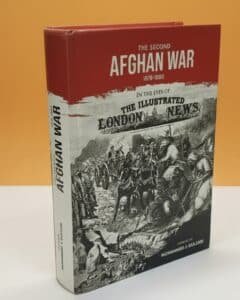
THE SECOND AFGHAN WAR 1878-1880
In The Eyes of The Illustrated London News
Step into the high-stakes drama of the Victorian “Great Game,” where empires clashed for supremacy in the mountains of Afghanistan. This unique work brings the Second Anglo-Afghan War to life not through modern hindsight, but through the vivid, immediate reports of The Illustrated London News from 1878–1880.
Experience the conflict through the eyes of its most celebrated wartime artist, William Simpson, whose meticulous illustrations capture extraordinary moments from the battlefield to the bazaar. Discover firsthand accounts that detail military strategy, tribal alliances, and the stark realities of a campaign fought against a formidable and proud people.
Here is history unfiltered: a masterfully compiled chronicle of geopolitics, culture, and conquest, offering an unparalleled window into the war that reshaped the frontiers of Central Asia.
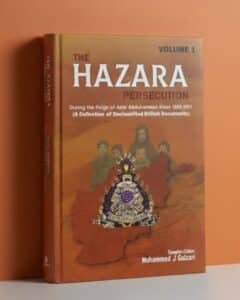
THE HAZARA PERSECUTION Vol. 1
During the Reign if Amir Abdul Rahman Khan 1880-1901 (A Collection of Declassified British Decuments)
Discover the untold story of the Hazara people, shaped by a war that changed everything. This groundbreaking work uncovers the 1891–93 Hazara War through once-secret British intelligence reports. For the first time, read the raw, confidential accounts from agents stationed in Kabul, Kandahar, and Herat during the height of the Great Game. Witness the strategic brutality of Amir Abdur Rahman Khan, the geopolitical maneuvers of empires, and the resilient spirit of a people facing systematic persecution. Move beyond the official histories. This is the essential, firsthand source that opens the door to understanding one of the longest-running tragedies in modern Afghan history.
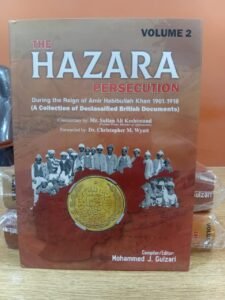
THE HAZARA PERSECUTION Vol. 2
During the Reign of Amir Habibullah Khan 1901 -1918(A Collection of Declasefied British Documents)
Follow the epic journey of the Hazara people into exile and survival. This second volume unveils their story beyond the battlefield, from 1901 to 1918. Discover how displaced communities rebuilt their lives in British India and Persia, finding solace at holy shrines and new roles in foreign armies. Through once-secret British intelligence, witness their complex existence as soldiers, farmers, and pivotal agents in the shadowy intrigues of World War I. This crucial work charts the dawn of the Hazara diaspora—a testament to resilience in the face of enduring persecution and a key chapter in the history of Central Asia.
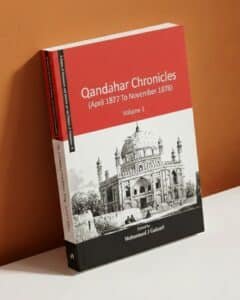
QANDAHAR CHRONICLES Vol. 1
(April 1877 to November 1878)
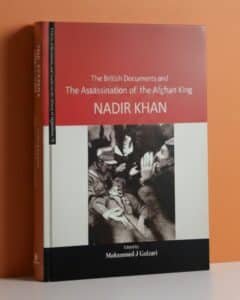
NADIR KHAN
Discover the untold story of the Hazara people, shaped by a war that changed everything. This groundbreaking work uncovers the 1891–93 Hazara War through once-secret British intelligence reports. For the first time, read the raw, confidential accounts from agents stationed in Kabul, Kandahar, and Herat during the height of the Great Game. Witness the strategic brutality of Amir Abdur Rahman Khan, the geopolitical maneuvers of empires, and the resilient spirit of a people facing systematic persecution. Move beyond the official histories. This is the essential, firsthand source that opens the door to understanding one of the longest-running tragedies in modern Afghan history.
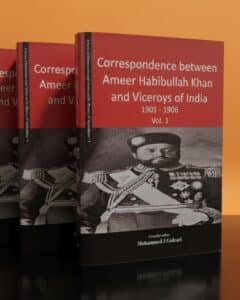
CORRESPONENCE BETWEEN (3 Volumes)
Ameer Habibullah Khan and Viceroys of India 1901-1919
Unlock the Secret Archives: The Definitive Diplomatic Correspondence of Afghanistan, 1901-1919
For over a century, the most intimate and consequential dialogues between the Afghan monarchy and the British Raj have remained shrouded in official secrecy, their details fragmented and their full significance largely absent from the public and academic spheres. Now, this monumental silence is broken with the publication of “Confidential Correspondence Between Amir Habibullah Khan and the Viceroys of India, 1901-1919.”
Presented across three meticulously compiled volumes, this landmark work unveils hundreds of secret, official letters, telegrams, and memoranda exchanged between Afghanistan’s ruler, Amir Habibullah Khan, and the successive Viceroys of India. This collection stands as one of the most significant and under-examined primary sources for understanding modern Afghan and South Asian history.
A Treasure Trove of Unfiltered History
Move beyond secondary accounts and historical conjecture.Within these pages lies the raw, unfiltered record of high-stakes diplomacy during a pivotal era—from Habibullah’s accession after his father’s assassination, through the delicate neutrality of World War I, to the dawn of Afghan independence. The correspondence offers an unprecedented, dual-perspective lens on critical issues:
· Political & Diplomatic Manoeuvring: Witness the intricate dance of sovereignty, subsidy, and suspicion as the Amir navigates the pressures of the “Great Game,” balancing internal court politics with external imperial demands.
· Economic & Military Strategy: Discover the detailed negotiations over British subsidies, arms supplies, and infrastructural projects, revealing how material support was intertwined with political leverage and Afghanistan’s quest for modernisation.
· Internal & Regional Dynamics: Gain insight into British concerns about pan-Islamism, tribal unrest across the Durand Line, and Afghan relations with Ottoman Turkey, Germany, and Russia, framing Afghanistan not as an isolated kingdom but as a central actor in regional geopolitics.
Redefining Afghan Historiography
This collection is more than a simple archival compilation;it is a transformative scholarly resource. For decades, the historiography of early 20th-century Afghanistan has been written with one eye closed, relying heavily on British colonial records or later Afghan narratives. This work provides the critical missing link—the Afghan sovereign’s own direct voice and the confidential British responses.
It offers a new window for review, challenging long-held assumptions and enabling a balanced, nuanced analysis of:
· Amir Habibullah Khan’s often-misunderstated statecraft and his strategy for preserving Afghan autonomy.
· The true nature of the Anglo-Afghan relationship beyond public treaties and confrontations.
· The internal decision-making processes within the Afghan court regarding modernization, foreign policy, and national identity.
An Indispensable Resource
“Confidential Correspondence Between Amir Habibullah Khan and the Viceroys of India, 1901-1919″is an indispensable resource for historians, political scientists, diplomats, and anyone seeking a deeper understanding of Afghanistan’s past, which continues to echo powerfully in its present. It is a foundational text that promises to revitalize academic discourse and provide an authentic, authoritative voice to a crucial chapter in the history of Afghanistan and the Indian subcontinent.
Delve into these volumes and witness the clandestine conversations that shaped a nation and a regi
